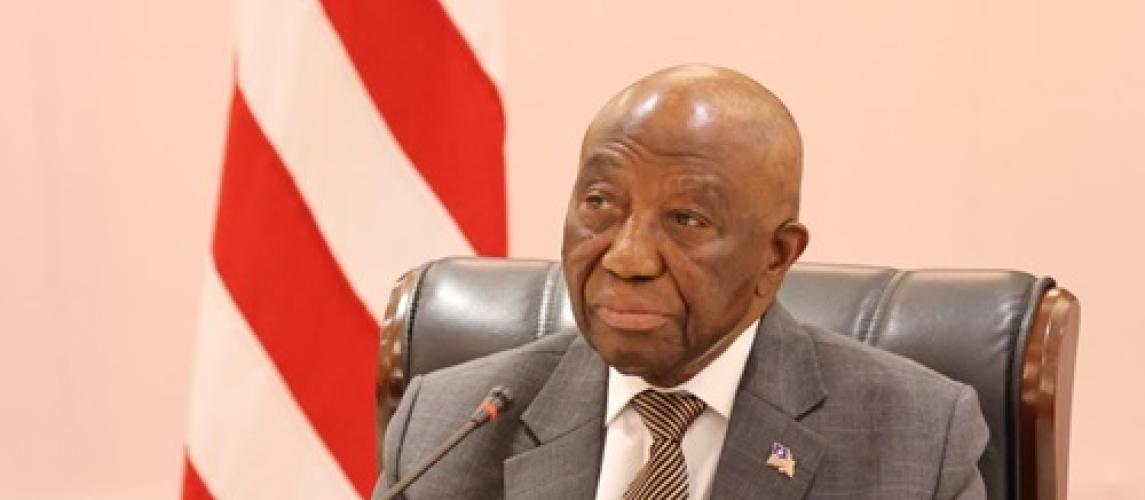
Cabinet Retreat Delivers Key Resolutions to Navigate Economic Realities and Drive Strategic Planning for FY2025
Executive Mansion, Monrovia - President Joseph Nyuma Boakai, Sr., has presided over a special two-day Cabinet Retreat which ran from October 9-10, 2024. The retreat was held under the theme, “Navigating Current Economic Realities and Strategic Planning for FY2025.”
The retreat brought together Cabinet Ministers, heads of agencies, and key government officials to address the critical financial challenges facing the country and to outline strategic priorities for the upcoming fiscal year.
With Liberia facing significant economic pressures, the retreat underscored the importance of cohesive planning, responsible fiscal management, and innovative approaches to national development. The discussions focused on aligning budgetary decisions with the nation’s growth objectives, ensuring economic stability, and fostering inclusive development.
President Boakai emphasized the importance of teamwork and shared responsibility as the Government works to steer the country through difficult economic terrain while laying a solid foundation for sustained growth and prosperity.
At the conclusion of the retreat, several key resolutions were adopted to guide Government actions in the upcoming fiscal year.
Key Resolutions adopted at the Cabinet Retreat included:
1. Prudent Fiscal Management and Prioritization:
The Cabinet emphasized the need for all ministries, agencies, and commissions to exercise prudent fiscal management in the face of October’s economic challenges.
To ensure the country meets its financial obligations, agencies were instructed to prioritize essential commitments and obligations to maintain fiscal stability.
2. Strict Adherence to National Road Fund Laws:
State-owned enterprises (SOEs), businesses, importers, and all relevant entities were reminded to fully comply with laws governing the collection of the National Road Funds. These funds are critical for sustaining Liberia’s infrastructure projects, and adherence to the regulations will ensure continued progress in road maintenance and development.
3. Launch of the ARREST Agenda for Inclusive Development (AAID):
The Cabinet unanimously endorsed the launch of the “ARREST Agenda for Inclusive Development” (AAID), a national development framework designed to promote equitable growth.
The ARREST Agenda will be officially launched by the end of November 2024. Budgetary allocations and government expenditures will be aligned with the objectives of the AAID to ensure resources are directed towards programs that foster inclusive economic development.
4. Diversification of Funding and Revenue Generation:
Recognizing the need to broaden the country’s revenue base, the Cabinet committed to exploring innovative and diverse funding sources. Efforts will be made to enhance revenue generation, including reforms in tax administration, increased public-private partnerships, and creative financing mechanisms to fund critical development initiatives.
5. Enforcement of Program Budgeting:
To ensure accountability and efficiency in the use of public resources, the Cabinet resolved to enforce program budgeting across all government sectors. Ministries, agencies, and commissions will be required to develop and implement budgets that directly link expenditures to measurable outcomes, ensuring that public funds are utilized effectively.
6. Revised Domestic Travel Ordinance for Government Decentralization:
In support of the decentralization of government services, the Cabinet reviewed and endorsed a revised Domestic Travel Ordinance. This policy aims to encourage government officials to engage more directly with local communities across the country, ensuring that essential services are delivered at all levels of governance.
7. Revision of Foreign Travel Ordinance:
The Foreign Travel Ordinance, last updated in 2016, was reviewed and revised to ensure more stringent guidelines on official travel by government officials. The revised ordinance aims at reducing unnecessary travel expenses and promoting fiscal responsibility in line with the Government’s broader commitment to budgetary discipline.
8. Public Sector Remuneration Reform:
A Special Presidential Committee on Public Sector Remuneration Reform, chaired by the Vice President, was directed to review the payment of board and sitting fees to members of statutory and non-statutory boards. The review aims to identify and eliminate any instances of waste or abuse and propose appropriate measures to ensure efficient use of public resources. This committee includes representation from the Ministry of Finance and Development Planning (MFDP), the Civil Service Agency (CSA), the Ministry of Justice (MOJ), the Governance Commission (GC), and other relevant entities.
9. Incentives for Private Sector Development:
In recognition of the private sector’s role in driving economic growth, the Cabinet endorsed a series of incentives to support private sector development.
Additionally, the publication of the new VAT Regulation was approved, providing greater clarity for businesses on tax obligations and fostering a more business-friendly environment.
10. Review of Government Fleet Management Policy:
The Cabinet instructed the General Services Agency (GSA) and the MFDP to conduct a comprehensive review of the current government fleet management policy. The goal is to propose revisions that will reduce maintenance costs, ensure better management of government vehicles, and improve overall efficiency. The findings of this review are expected to be presented to the Cabinet within a week.
11. Consultancy Hiring Guidelines for FY2025:
The CSA, in conjunction with the MFDP, was tasked with developing updated guidelines for the hiring of consultants for the FY2025 budget. This is aimed at ensuring that all consultant engagements are conducted transparently and that only essential expertise is sought in alignment with the Government’s financial priorities.
12. Cabinet Clearance of Significant National Policies:
Finally, the Cabinet agreed that all policies and measures with significant national implications must be cleared by the Cabinet before they are rolled out by the respective ministries, agencies, and commissions. This will ensure that major initiatives are consistent with the Government’s broader national development agenda.
Commitment to National Development and Stability:
The Cabinet reaffirmed its commitment to navigating the current economic realities with a strong focus on fiscal responsibility and strategic planning.
The resolutions adopted during the retreat are designed to promote national stability, inclusive development, and long-term economic growth in FY2025 and beyond.
Liberians can be assured that the Government, under the leadership of President Boakai, is working diligently to overcome the country’s financial challenges while laying the groundwork for a brighter and more prosperous future.
